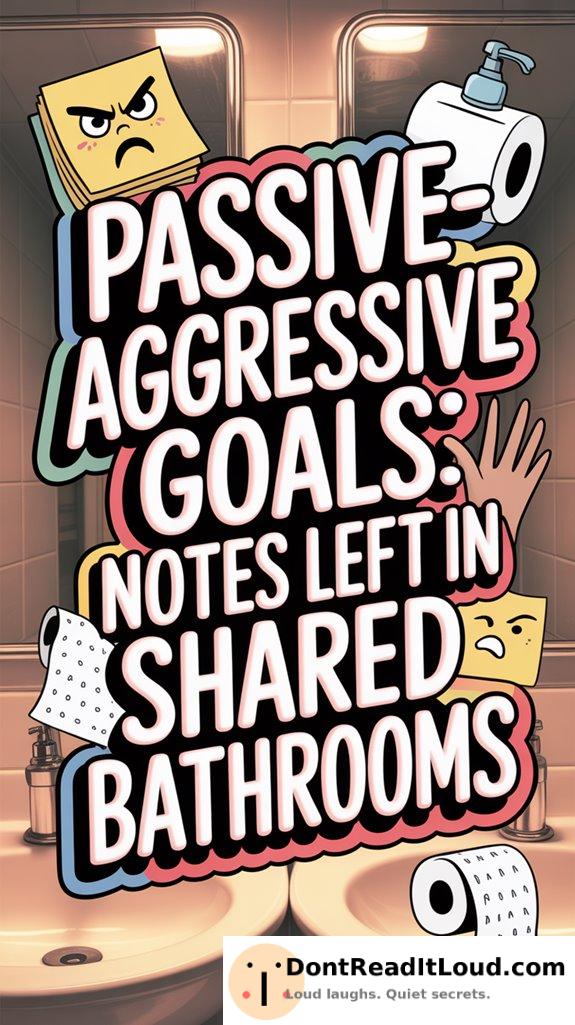
In shared bathrooms, passive-aggressive notes rely on humor and sarcasm to address frustrations indirectly. These messages often mix politeness with a sharp edge, urging roommates to fix habits like forgetting to flush. While amusing, such notes may increase tension and discourage honest discussion. To keep things friendly, encourage open conversations and set clear expectations. Explore how these notes transform everyday spaces into platforms for subtle conflict.
The Art of the Passive-Aggressive Bathroom Note
Why do passive-aggressive bathroom notes grab our attention? Maybe it’s their sly humor or the way they skirt around awkward hygiene conversations with a pointed message.
You step into the shared restroom and spot a note with a tone sharper than a razor. It says, “Please flush,” but the real message is clear: “Hey, remember what a toilet is for!” These notes, often scribbled on crumpled paper, are masters of uncomfortable communication, turning ordinary restrooms into stages for quiet conflict.
The blend of politeness and bite makes them entertaining, adding a little humor to your routine. So next time you see one, admire that clever mix of manners and mischief.
Psychological Motivations Behind the Notes
Ever wonder what motivates someone to leave a passive-aggressive note in a bathroom? It’s a mix of guilt-tripping and making social expectations clear.
Picture yourself as the culprit leaving a mess behind. The note-writer steps in, equipped with a neon post-it and a mission to spark just enough guilt to encourage better behavior.
They’re not merely complaining; they’re also setting a standard for cleanliness. There’s a touch of theatricality, but without any official recognition. Their aim is to prompt change without direct confrontation.
Impact on Roommate Dynamics and Relationships
When passive-aggressive notes appear in shared living spaces, they can subtly shift roommate dynamics. Suddenly, the bathroom isn’t just for your morning routine; it becomes a stage for emotional messages.
You find yourself interpreting cryptic complaints about toothpaste caps and toilet paper, questioning if your roommate has a secret life as a detective. This lack of direct communication turns simple chores into a game of guessing motives and intentions.
Your relationship can start to feel like a silent film, where pointed glances replace honest conversation. You’d expect adult communication, but a new note appears instead.
Direct discussions fade, replaced by dramatic messages taped to the bathroom mirror.
Strategies for Addressing the Underlying Issues
To effectively address passive-aggressive communication, start by creating an open environment for honest conversation. Imagine discussing dirty dishes with a bit of humor instead of leaving cryptic notes.
Approach your roommate openly, letting them know you’d rather talk things out than send mixed signals. This helps avoid misunderstandings and makes setting boundaries feel less daunting.
Set clear expectations without sounding overbearing. Try, “Hey, can we rinse dishes before they pile up?” as a friendly request.
Regular check-ins keep communication smooth, making passive-aggressive notes a thing of the past. Humor can help turn minor conflicts into opportunities for better understanding and smoother living together.
Conclusion
You’ve explored the nuances of passive-aggressive bathroom notes, learning about their motivations and their impact on relationships. These notes may appear minor, but they often point to deeper issues with communication that can disrupt harmony. Rather than leaving a note, address the underlying problem directly. Honest conversations help build stronger relationships and a more peaceful shared space. Next time you feel like scribbling a pointed message, try discussing the issue face-to-face instead.



